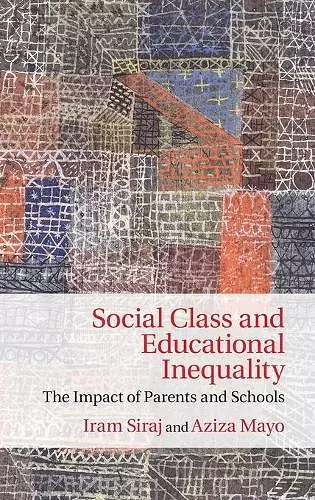Social Class and Educational Inequality
The Impact of Parents and Schools
Iram Siraj author Aziza Mayo author
Format:Hardback
Publisher:Cambridge University Press
Published:5th Jun '14
Currently unavailable, and unfortunately no date known when it will be back
This hardback is available in another edition too:
- Paperback£32.99(9781107562301)

This book examines the impact that parents and schools have on disadvantaged children who perform against the odds.
For a society aiming to 'narrow the gap' between the educational attainment of children from disadvantaged and more privileged backgrounds, we need to understand how and why certain children manage to succeed against the odds. This book examines the impact of social-class, parenting and education on fifty children sampled from a bigger longitudinal study.Social class is often seen as an intractable barrier to success, yet a number of children from disadvantaged backgrounds still manage to show resilience and succeed against the odds. This book presents the findings from fifty Child and Family Case Studies (CFCS) conducted with 13-16 year olds. The authors look specifically at the roles that people and experiences - at home, in schools and in the wider community - have played in the learning life-courses of these children; how these factors have affected their achievement; and explanations and meanings given by respondents to the unique characteristics, experiences and events in their lives. Featuring the voices of real parents and children, and backed up by a decade of quantitative data, this is a compelling record that will help readers to understand the complex nature of social disadvantage and the interplay between risk and protective factors in homes and schools that can make for a transformational educational experience.
'This book is a stupendous achievement and deserves to be very widely read. The authors' large-scale longitudinal research into why some children succeed 'against the odds' and others do worse than expected given their relatively privileged start in life is already widely known. This book puts 'flesh' onto the bones of the data, providing case studies of fifty children (those who succeed and those who don't from both working-class and middle-class backgrounds) that exemplify their findings in a truly marvellous way. Equally impressive, Siraj and Mayo illustrate the power and importance of a solid theoretical foundation. They draw on scholars such as Urie Bronfenbrenner to show that the everyday activities and interactions that occur between children and their parents, their teachers, and people in the wider community have profound effects on academic performance from early childhood through adolescence. The authors also do a wonderful job revealing the way that these interactions also influence, and are influenced by, personal characteristics of the children themselves and of the various people with whom the children interact. The book's combination of intellectual rigour and ease of reading makes it a resource that will serve equally for undergraduates interested in understanding development and scholars working in the area of risk, resilience, parenting practices, and school achievement.' Jonathan Tudge, University of North Carolina, Greensboro
'The child and family case studies presented in this important book add considerable value to the large-scale longitudinal study from which they are drawn. In studying children who succeeded against the odds or did not fulfil expectations, the authors lay bare the human stories that, in particular cases, confirm or interrupt the prevailing link between social background and educational achievement. By identifying what - in the home, the school and the community - can make a difference one way or the other, the message is ultimately an optimistic, though realistic, one.' Geoff Whitty, Director Emeritus, Institute of Education, University of London and Research Professor in Education, Bath Spa University
'Why do some children succeed academically while others fail? How can we help more children fulfil their potential regardless of their backgrounds? These are the important questions explored by Iram Siraj and Aziza Mayo's new book, Social Class and Educational Inequality … The book is underpinned by a rich set of case studies … bringing together the voices of the children and their parents and teachers with the quantitative data on their trajectories and findings from the broader literature … I highly recommend the book as a core text for students studying young people's lives in education, human development and other social sciences. The authors draw upon and integrate a mix of theories from fields including sociology, psychology and anthropology, for a truly cross-disciplinary examination of the links between social disadvantage and academic outcomes. The book serves as an excellent teaching tool for the application of major theories and concepts.' Amy Conley Wright, Pedagogy, Culture and Society
'Social Class and Educational Inequality is well worth reading. It arrives at a time when we need to bring parenting practices and schools back into the post-modern debate about children's educational achievement. The authors have done substantial research and the book is rich with mixed data sets and empirical literatures that critically explain the major issues it examines.' Gbenga Emmanuel Afolayan, Global Education Review
- Winner of Book Prize (1st Prize), Society for Educational Studies 2015
ISBN: 9781107018051
Dimensions: 235mm x 155mm x 22mm
Weight: 590g
330 pages